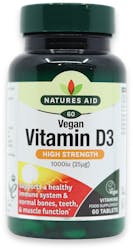Nature's Aid Vitamin D3 1000iu (25µg) 90 Tablets
Nature's Aid Vitamin D3 1000iu (25µg) 90 Tablets
What 500,000+ customers say about medino:
Description
Natures Aid Vitamin D3 contributes to: The maintenance of normal bones, teeth, muscle function.
Benefits:
- Prevention of deficiency including vegans, dark-skinned people, alcoholics, people with kidney, liver or coeliac disease.
- Seasonal Affective Disorder. Supplementing with vitamin D can often produce improvements in mood in those with SAD in as little as aweek.
- Bone Health as Vitamin D plays a key role in the regulation of calcium and phosphorus levels in the blood by promotingabsorption in the intestines and calcium re-absorption in the kidneys. This leads to normal calcification ofthe bone matrix, needed for bone growth and repair.
- Immune Health as Vitamin D plays a role in the immune system by virtue of the fact that it promotes the process ofphagocytosis (where immune cells engulf bacteria etc.), anti-tumour activity and a modulating effect onthe immune system.
Suitable for vegetarians.
Can be used during pregnancy or while breastfeeding, but 400iu or 1000iu max a day.
Can be used while on HRT and if you suffer from diabetes, but always speak to the doctor first.
FREE FROM: GM, corn, dairy, lactose, gluten, wheat, yeast, nuts, salt, soya, starch and sugar, artificial colour and flavour.
Ingredients
| Nutritional Information | Average per tablet | % EC NRV* |
|---|---|---|
| Vitamin D3 (Cholecalciferol) | 25µg (1000iu) | 500 |
*NRV – Nutrient Reference Value take an additional multivitamin. µg – microgram, mg – milligram, IU – International Unitsnits.
Other Ingredients: Microcrystalline Cellulose, Di-Calcium Phosphate, Sodium Carboxymethylcellulose, Anticaking Agents (Silicon Dioxide, Vegetable Source Magnesium Stearate).
Usage and Instructions
This product is suitable for all ages but it is advised to reduce dosage according to age and weight.
Take 1 tablet per day with food.
Do not exceed the recommended intake
Warnings
Vitamin D has the greatest potential for toxicity of all the vitamins, though amounts up to 1000mcg are generally agreed to be safe in adults. Younger adults or children may supplement up to 400iu daily. Vitamin D is theoretically contraindicated while taking warfarin (albeit no case of increased bleeding has ever been reported) and verapamil medications. Oestrogen-based hormone medications may increase blood levels of vitamin D (and hence improve bone density), but also cause a fall in the beneficial HDL cholesterol.







